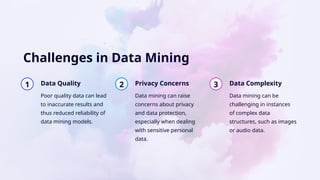Basic concept of Data-Mining and it Applications
- 1. Data Mining: An Overview Welcome to our lecture slides on data mining and it will be discussing the benefits, techniques, and applications of data mining, as well as the challenges and ethical considerations surrounding it. Dr. Irshad Ahmed
- 2. What is Data Mining? Data mining is the process of extracting meaningful patterns from large data sets. It can be used to identify relationships, forecast trends, and even help companies make better business decisions. Data mining has revolutionized many industries, including healthcare, retail, and finance.
- 3. The Benefits of Data Mining Improved Decision Making Data mining can help identify patterns and trends that may not be immediately obvious, allowing organizations to make better informed decisions. Increased Efficiency With data mining, companies can discover more efficient ways to operate and reduce costs. Customer Insights Data mining can help companies gain a better understanding of their customers' behaviors and preferences, leading to more effective marketing campaigns. Improved Quality Control Data mining can help identify defects and quality issues in products, allowing companies to address them more effectively.
- 4. Common Techniques in Data Mining 1 Classification Classification involves categorizing data into predefined groups based on their characteristics. This can help identify patterns and make predictions based on those patterns. 2 Clustering Clustering involves grouping similar data points together based on their attributes. This technique is often used in market segmentation. 3 Association Rule Mining Association rule mining identifies relationships between variables in a data set. For example, a grocery store might use association rule mining to identify items that are frequently purchased together.
- 5. Applications of Data Mining Healthcare Data mining can be used to identify disease patterns and improve patient outcomes. Retail Data mining can help retailers identify buying patterns and optimize pricing strategies.
- 6. Challenges in Data Mining 1 Data Quality Poor quality data can lead to inaccurate results and thus reduced reliability of data mining models. 2 Privacy Concerns Data mining can raise concerns about privacy and data protection, especially when dealing with sensitive personal data. 3 Data Complexity Data mining can be challenging in instances of complex data structures, such as images or audio data.
- 7. Ethical Considerations in Data Mining Data mining techniques can be used for purposes that are potentially unethical or even harmful, such as discrimination or profiling. It is important to consider the potential impact of data mining on individuals and society, and take steps to ensure that it is used responsibly.
- 8. Conclusion and Future Directions Data mining continues to play an increasingly important role in many areas of our lives. As technology advances and data becomes even more ubiquitous, it is likely that data mining will become even more prevalent in even more industries. However, it is important to address the challenges and ethical concerns surrounding data mining to ensure that its impact is positive and beneficial for all.









